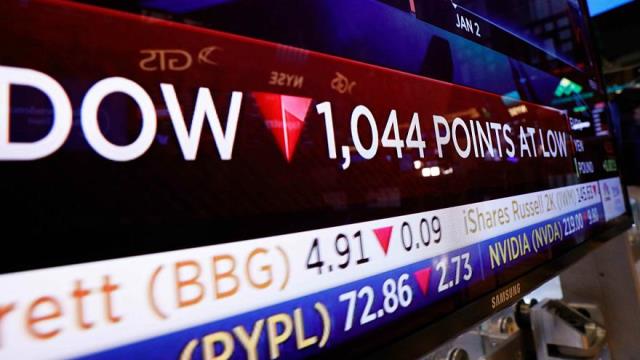A recovery by global stocks proved short-lived as warnings over a slowing European auto sector soured an upbeat mood, while Wall Street was set for a slightly lower open after enjoying its best session in eight months the previous day.
European stocks, having hit a one-week high in early trade, were back in the red by 1200 GMT, pulled lower by a 1.6 percent fall in an index of auto stocks.
This came after Goldman Sachs analysts said slowing car demand in China and new regulations on emissions testing were hurting investors’ sentiment toward European autos stocks, and warned this results season could be challenging.
Meanwhile, Wall Street futures were down about 0.3 percent, suggesting a lower open, with IBM shares down 4.4 percent in pre-market trading after a revenue miss.
“Not too surprisingly the effervescent bounce back in Asia equity sentiment has given way,” Stephen Innes, a trader at OANDA, said in a note to clients.
“Let’s not lose sight of the enormity of global risks which suggests the isolated US growth theme will come to a not so subtle end just like the synchronized global growth theme did, at least until US-China trade dispute is settled.”
Earlier, Asian stocks shone after a forecast-beating set of U.S. company earnings improved the mood on world equity markets.
MSCI’s ex-Japan share index added 0.6 percent while Japan’s Nikkei jumped 1.3 percent.
The gains followed a scintillating New York session where the three major indexes tallied their biggest one-day percentage gains since March, rising more than 2 percent each.
But even that only marked a partial recovery from a recent pullback that saw the S&P 500 index post its biggest weekly drop since March.
While the dollar’s mini-bounce off two-week lows checked emerging-market gains, they were supported by easing tensions between Saudi Arabia and the United States, as well as signs that Turkey’s currency crisis had been laid to rest.
“There are negative risks in the short term, but on the positive side we have good earnings and data from the United States,” said Christoph Barraud, an economist at Paris-based brokerage Market Securities.
“Last week’s correction was extreme, a lot of people became short (the market) so this is a bit of normalization.”
Overall, third-quarter earnings for S&P 500 companies are seen growing 21.8 percent, according to I/B/E/S Refinitiv.
Tuesday’s gains were triggered by Netflix, which shot 12 percent higher after the close as its results beat market expectations. That sent shares of Alphabet Inc, Facebook Inc and Amazon.com Inc up about 1 percent in extended trade.
The four make up the so-called FANG group of high-growth companies, which in recent months has lost some of its momentum following market-leading gains in recent years.
Banking giants Goldman Sachs and Morgan Stanley also posted better-than-expected quarterly profits. And on the data front, U.S. industrial production rose for a fourth straight month in September, soothing fears the economy may be running out of steam.
Barraud said the out-performance of U.S. equities was likely to continue.
“People want to put money where there is best visibility … In the U.S., you have growth visibility, strong earnings (as well as) buybacks and dividends … So the U.S. is still attractive compared to peers,” he said.
MSCI’s global equity index touched a one-week high. MIWD00000PUS, but was flat by 1200 GMT.
DOLLAR AND EMERGING MARKETS
A strengthening dollar meant that emerging-market currencies lost some steam as the session wore on.
Turkey’s lira is coming slightly off 2 1/2-month highs, having rallied 10 percent over the past week as the release of an imprisoned U.S. pastor fueled hopes of a rapprochement with Washington. Ankara said investors had put in $6 billion in bids for $2 billion of bonds it sold on Tuesday, though it had to pay a substantial new-issue premium.
Saudi Arabia’s stocks and currency also stabilized after U.S. President Donald Trump gave Saudi Arabia the benefit of the doubt in the disappearance of dissident journalist Jamal Khashoggi.
MSCI’s emerging currency index eased off 2 1/2-week highs, losing steam as the dollar firmed. Emerging equities also eased off earlier session-highs.
The dollar rose 0.4 percent against a basket of currencies after being undermined on Tuesday fresh criticism of the U.S. Federal Reserve from Trump. He told Fox Business Network: “My biggest threat is the Fed.”













